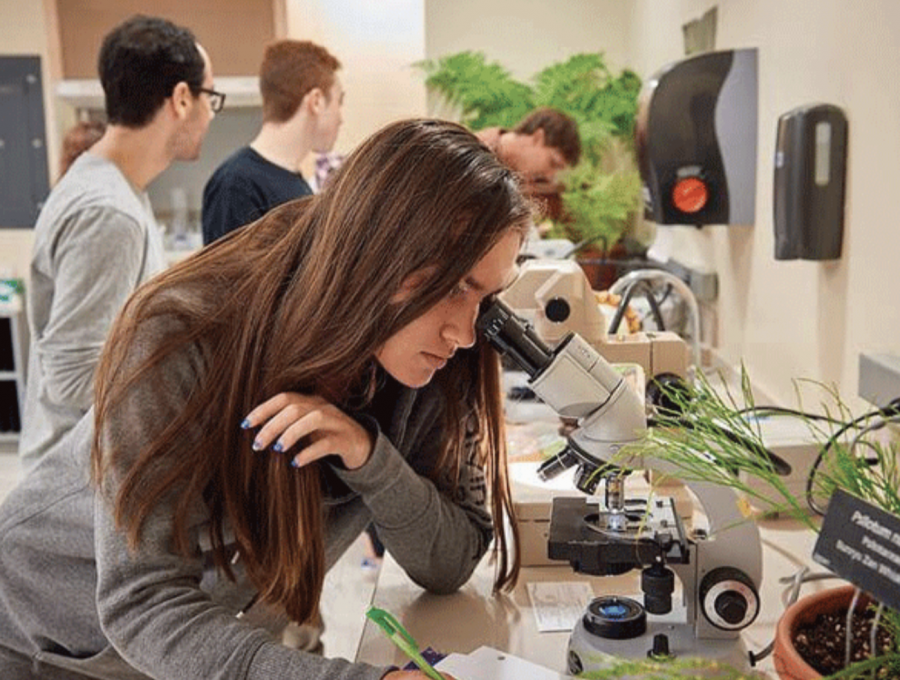Core Curriculum Under Administrative Review
Colgate’s Core curriculum emerged from the 1930s “Colgate Plan,” formally adopted by the university in 1946. Since its original approval, Colgate faculty have continued to review the curriculum, with revisions made in 1983, 1996 and 2010. Dean of Faculty Tracey Hucks, President Brian Casey and other members of the administration began discussing updating the Core curriculum in April 2018 as part of the first phase of the Core self-study. At the same time, faculty met with student groups, previous Core leaders and other professors to reflect on the curriculum.
In the spring, four faculty members were elected to join the five appointed University Professors (UPs) and the Director of the Division of University Studies to create the Core Revision Committee (CRC).
To fulfill graduation requirements, all students must complete Core courses in Legacies of the Ancient World, Challenges of Modernity, Communities and Identities, Scientific Perspectives on the World and Global Engagements by the end of their sophomore years. Colgate is one of many private, liberal arts universities that requires a Core curriculum, which values “interdisciplinarity of knowledge,” “shared intellectual engagements” and “old questions, new contexts,” according to Colgate’s website.
Challenges of Modernity is one of the five classes to undergo new changes. According to Christian DuComb, UP for Core 152: Challenges of Modernity, earlier versions of the course focused primarily on texts from Western Europe and the United States. The course now includes postcolonial critique and consideration of modern experiences around the globe.
“As part of the Core Revision Committee this year, my role is to help develop and propose models for a revised liberal arts Core curriculum to the faculty as a whole,” DuComb said. “The Core is revised every 10 to 12 years to reflect new developments in academic research, as well as the changing needs of both students and faculty. Knowledge is not a static thing; it’s constantly growing and evolving. The Core revision process has to balance continuity with the past with a meaningful response to the rapid changes in the world around us.”
Susan Thompson, who serves as UP for Communities and Identities, member of the CRC, and assistant professor of Peace and Conflict studies said that some of the review process takes place during White Eagle, an annual faculty workshop.
“For the last two years, White Eagle has been focused on the Core revision…[we] reflect on what’s working, what’s not working, what’s changing in our classroom, what we could do differently or better, what about this reading, should we maybe add or drop [one],” Thompson said. “There’s always updates because new ways of thinking and new ways of doing come to be.”
First-year student Audrey Hong, who is enrolled in CORE 151: Legacies of the Ancient World, said she feels the class’ content calls for more variation.
“In class, we are reading the Bible, specifically Genesis and Exodus, and I don’t feel as though the list of readings is diverse enough to cover all perspectives. If we read the Bible at the same time as another text, possibly from a scientific perspective, the class would be more thought-provoking,” Hong said.
In the Core review’s second phase, UPs encouraged feedback like Hong’s in meetings with the Student Senate and other school leaders, tasking twenty students to compare Colgate’s curriculum with that of other universities. Following various forums, the university released a faculty-wide survey, which closed September 29. According to Thompson, that data will be reviewed and analyzed as a preliminary step before creating new Core models.
This academic year, the CRC will continually utilize student and faculty feedback from the first two phases of the review in drafting revisions of the curriculum in anticipation of a faculty meeting in the spring of 2020.
Junior Ally Kriss said she feels the Core revision should focus on Scientific Perspectives and Communities Identities.
“I think Legacies and Challenges are really useful especially because they follow an umbrella structure,” Kriss said. “I think that the other cores need more structure so that students leave the overall Core Curriculum with a universally enriching experience. It is unclear what skills Scientific Perspectives and Communities and Identities are supposed to develop.”







